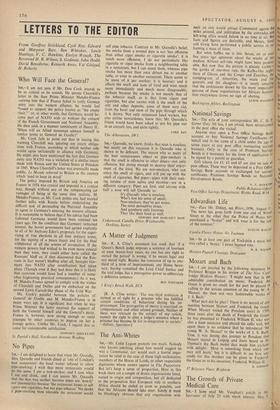LETTERS TO THE EDITOR
From: Geoffrey Strickland, Cyril Ray, Edward and Margaret Barr, Ben Whitaker. Lewis Hastings, V. C. Hawkins, Evelyn Waugh, The Reverend H. R. Wilson, S. Godman, John Dodd, David Benedictus, Kenneth Ames, Val Gielgud, H. Roberts.
Who Will Face the General?
SIR,—I am not sure if Mr. Don Cook intends to be as cynical as he sounds. He quotes Churchill's letter to the then Prime Minister Mendes-France :corning him that if France failed to ratify German entry into the western alliance, he would feel "'sound to support the policy known as "the empty chair,"' or, in other words, that Germany would be- come part of NATO with or without the consent of the French Government and National Assembly. He then adds in a manner reminiscent of Henry II: 'When will an Allied statesman address himself in similar terms to General de Gaulle?'
Mr. Cook fails to point out that in issuing this warning Churchill was ignoring our treaty obliga- tions with France, according to which neither side would agree unilaterally to alliance with Germany. He might also have mentioned the fact that German entry into NATO was a violation of a similar treaty made with Russia and the United States at Potsdam in 1945. When Churchill's letter was eventually made public, Le Monde referred to Britain as the country which 'used to keep its word.'
The policy imposed by Britain and America on France in 1954 was cynical and imposed in a cynical way, though without any of the compensating ad- vantages of being at the same time realistic. M. Mendes-France, as Mr. Cook points out, had wanted further talks with Russia before undertaking the difficult task of persuading the National Assembly to agree to Germany's entering the western alliance. It is reasonable to believe that if his advice had been followed Germany would have been reunited ten years ago. On the condition that Germany remained neutral, the Soviet government had agreed explicitly to all of Sir Anthony Eden's proposals for the super- vising of free elections in all four military zones, for the signing of a peace treaty and for the final withdrawal of all the armies of occupation. If the western powers had wished to be even more cynical than they were, they could either have called the Russians' bluff or, if they discovered that the Rui- sians in fact weren't bluffing after all, brought Ger- many into NATO after reunification had taken place. (Though even if they had done this it is likely that cynicism would have had a number of some- what frightening practical consequences.) As it was, M. Mendes-France agreed to comply with the wishes of Churchill and Dulles and we embarked on the second Lewis Carroll-like phase of the Cold War.
Mr. Cook's parallel between the policies of General de Gaulle and M. Mendes-France is in many ways apt. It is significant that when he was Prime Minister the latter received the support of both the General himself and the General's party. France is. however, now strong enough to resist attempts by other countries to impose on her a foreign policy. Unlike Mr. Cook, I regard this as cause for considerable satisfaction.
GEOFFREY STRICKLAND
St. Patrick's Hall, Nord:court Avenue, Reading






























 Previous page
Previous page